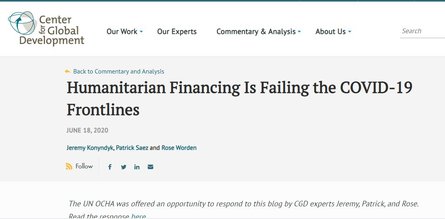
The UN OCHA was offered an opportunity to respond to this blog by CGD experts Jeremy, Patrick, and Rose. Read the response here.
Longstanding weaknesses in the humanitarian business model are undermining the COVID-19 response in fragile and conflict affected states. Extensive delays, poor mechanisms for tracking disbursement of funds from intermediaries to implementers, and persistent obstacles to financing local actors are preventing funds from reaching organizations on the frontlines of the COVID-19 fight.
Donor governments have generously contributed nearly $2.5bn in humanitarian COVID-19 financing. But what seems timely from a donor perspective – a rapid disbursement toward an appeal – does not necessarily translate into timely frontline delivery. That is a concern in any crisis, but it is debilitating in outbreak response where lost weeks or months can allow exponential spread of the virus.